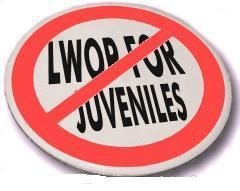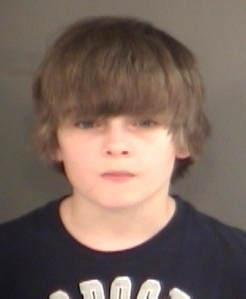
Amnesty International Press Release
Under Embargo Until
Wednesday, November 30, 2011 at 12:00 AM EST
United States Must Halt Life Without Parole Sentences for Children, says Amnesty International
Human Rights Organization Details Stories of Three Young Offenders From Louisiana, Illinois and North Carolina, in New Juvenile Justice Report
Louisiana Case to be Featured in Amnesty International’s Global Write-a-Thon
Contact: Gwen Fitzgerald, gfitzgerald@aiusa.org, 202-509-8194
(Washington, D.C.) -- Authorities in the United States must ban the imposition of life without parole sentences against children and review the cases of more than 2,500 prisoners currently serving such sentences to bring the sentences into line with international law, Amnesty International said today in a new report.
"In the United States, people under 18 cannot vote, buy alcohol or lottery tickets or consent to most forms of medical treatment, but they can be sentenced to die in prison for their actions. This needs to change,” said Natacha Mension, U. S. campaigner at Amnesty International (AI).
Children as young as 11 at the time of the crime have faced life imprisonment without parole in the United States – the only country in the world to impose this sentence on children.
Amnesty International’s 34-page report 'This is where I’m going to be when I die': Children facing life imprisonment without the possibility of release in the United States, illustrates the issue through the stories of Christi Cheramie, Jacqueline Montanez and David Young.
In the United States, life without parole can be imposed on juvenile offenders as a mandatory punishment – without consideration of mitigating factors such as history of abuse or trauma, degree of involvement in the crime, mental health status, or amenability to rehabilitation.
"We are not excusing crimes committed by children or minimizing their consequences, but the simple reality is that these sentences ignore the special potential for rehabilitation and change that young offenders have," said Mension.
In May 2010, the U.S. Supreme Court said life without parole is "an especially harsh punishment for a juvenile," as the young offender will serve, on average, more years and a greater percentage of his life in prison than an older offender. "A 16-year-old and a 75-year-old each sentenced to life without parole receive the same punishment in name only," the Court said.
Eighteen months after prohibiting this sentence for non-homicide crimes committed by under-18-year-olds, on November 8, 2011, the Supreme Court agreed to consider this issue in relation to crimes involving murder. It will not issue a decision until the second quarter of 2012 at the earliest.
The U.N. Convention on the Rights of the Child, which entered into force more than two decades ago, expressly prohibits the imposition of life imprisonment without the possibility of release for offenses, however serious, committed by people under 18 years old. All countries except the United States and Somalia have ratified the Convention.
"It is long past time for the United States to ratify the Convention without reservations or other limiting conditions and to fully implement its prohibition on the use of life imprisonment without release against children, including in relation to the cases of those already sentenced," said Mension.
On November 30, Christi Cheramie, who is serving life without parole in Louisiana, will submit an application for executive clemency with the state Board of Pardons. Christi was sentenced to life in prison without the possibility of release in 1994, when she was 16 years old for the killing of her 18-year-old fiancé’s great aunt.
She pleaded guilty just before her trial in adult court began, fearing she could be sentenced to death if the trial went ahead. Her guilty plea prevents her from directly appealing her conviction or sentence.
A psychiatrist who saw Christi prior to her trial said that she was a "depressed, dependent, and insecure" 16-year-old who "seems to have been fearful of crossing" her fiancé, who she maintains committed the crime. Christi’s childhood was marked by sexual abuse. At the age of 13, she was hospitalized in a psychiatric clinic after trying to commit suicide on at least two occasions.
After spending half of her life in prison, Christi believes she has changed in many ways. She has obtained a high school equivalency diploma, a degree in agricultural studies, and teaches a number of classes at the prison. A warden has stated that she is "worthy of a second chance." View a video of Christi’s grandmother and her conversation with Christi here:
http://www.youtube.com/watch?v=_AHsW9YbP1A&NR=1
Christi will be among 15 people for whom Amnesty International activists worldwide will be taking action as part of Write for Rights – the Global Write-a-Thon on December 3 - 11. Hundreds of thousands of people worldwide will be educated about Christi’s case and asked to call on Governor Jindal to help. In the United States, more than 35,000 people are expected to participate in this annual event. http://www.amnestyusa.org/writeathon
Additionally, on Dec. 3 in New Orleans, Amnesty International USA, the Juvenile Justice Project of Louisiana, the Louisiana Interfaith Conference and Citizens for Second Chances will hold an event from 4 to 7 pm with a candlelight vigil, music and speakers focusing on Christi’s case at St. Anna’s Episcopal Church, 1313 Esplanade Avenue. For more information visit www.jjpl.org
A clemency campaign is also pending for a second person whose case is profiled in AI’s report. Jacqueline Montanez is the only woman in Illinois serving a sentence of life imprisonment without the possibility of parole for a crime committed as a child. A victim of child abuse, Jacqueline began abusing drugs and alcohol at the age of nine. Jacqueline’s abuser was her step-father, a gang leader, who also involved her in the drug trade as a very young child and groomed her to be his “little soldier.” After running away from home and joining a rival gang, she and two older women shot and killed two adult male members of her step-father’s gang.
Because she was 15 at the time of the crime and charged with first degree murder, she was automatically tried in adult criminal court. This denied the court system the opportunity of conducting a transfer hearing to determine whether her case ought to have been tried in juvenile court where factors such as her young age, home environment or amenability to rehabilitation would have been considered. Jacqueline was also automatically sentenced to life without parole due to her conviction; the sentencing court had no discretion to consider her history, her age, the circumstances of the offense or her potential for rehabilitation.
Now 35 years old, she expresses deep remorse for her actions and believes that she has grown into a very different person. She has obtained a high school equivalency diploma and has become a certified trainer of service dogs for disabled people. She grieves for her victims and the pain that their families have suffered.
In Illinois, 80 percent of children in prison for life without parole received mandatory sentences; about 82 percent are prisoners of color. That number is even higher in Cook County, where the Montanez case originated. These findings were published by the Illinois Coalition on the Fair Sentencing of Children in its 2008 report Categorically Less Culpable, Children Sentenced to Life Without Parole in Illinois. http://www.law.northwestern.edu/cfjc/jlwop/documents/JLWOP_Report.pdf
Jacqueline’s petition for executive clemency will be submitted to the Illinois governor and the Prisoner Review Board in January 2012.
David Young is one of two teenagers arrested and charged for the murder of Charles Welch in 1997. He was automatically charged in adult criminal court as required by North Carolina law for any criminal offense committed by anyone age 16 or older. Young’s co-defendant, who shot the victim, pleaded guilty to second-degree murder and was sentenced to 19 to 23 years in prison. David was convicted of first-degree felony murder and was sentenced to life without parole.
Young grew up in a hostile community environment where his parents abused drugs and his stepfather physically abused him and his mother. Now 32 years old, Young obtained his high school equivalency diploma and is in solitary confinement after being stabbed by two prisoners.
Amnesty International is a Nobel Peace Prize-winning grassroots activist organization with more than 3 million supporters, activists and volunteers in more than 150 countries campaigning for human rights worldwide. The organization investigates and exposes abuses, educates and mobilizes the public and works to protect people wherever justice, freedom and dignity are denied.
For a copy of the report, 'This is where I’m going to be when I die': Children facing life imprisonment without the possibility of release in the United States, email Gwen Fitzgerald at gfitzgerald@aiusa.org. Photos are available online athttps://adam.amnesty.org/asset-bank/action/quickSearch?keywords=newsflash+LWOP. For more information, please visit: www.amnestyusa.org.





